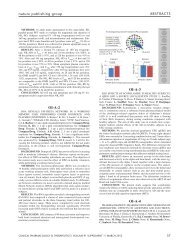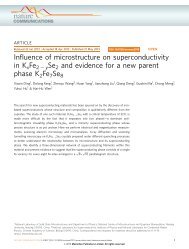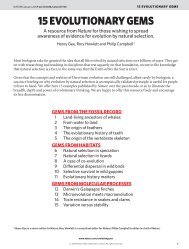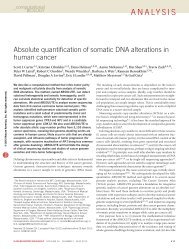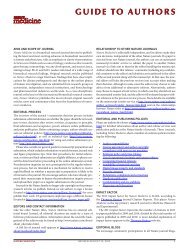open access: Nature Reviews: Key Advances in Medicine
open access: Nature Reviews: Key Advances in Medicine
open access: Nature Reviews: Key Advances in Medicine
Create successful ePaper yourself
Turn your PDF publications into a flip-book with our unique Google optimized e-Paper software.
UROLOGY<br />
<strong>Key</strong> advances<br />
■ Encourag<strong>in</strong>g results have been obta<strong>in</strong>ed<br />
from studies of targeted therapies <strong>in</strong><br />
bladder cancer, 1 lay<strong>in</strong>g the groundwork for<br />
future <strong>in</strong>vestigation <strong>in</strong> this area<br />
■ The report<strong>in</strong>g of a second randomized<br />
phase III trial of neoadjuvant<br />
chemotherapy 3 confirms a survival<br />
advantage for patients with muscle<strong>in</strong>vasive<br />
bladder cancer<br />
■ A 20-gene expression model has been<br />
developed 5 that can identify patients,<br />
before cystectomy, at high risk of lymph<br />
node <strong>in</strong>volvement<br />
■ Evidence suggests a number of chromat<strong>in</strong><br />
remodel<strong>in</strong>g genes are <strong>in</strong>volved <strong>in</strong> bladder<br />
cancer, 6 represent<strong>in</strong>g a novel area for<br />
future <strong>in</strong>vestigation<br />
■ The immunohistochemical assessment of<br />
p53 is not a useful marker of prognosis or<br />
predictive of response to chemotherapy 9<br />
<strong>in</strong>vasion. Conceivably, with further validation,<br />
patients at high risk of node-positive<br />
disease could be identified us<strong>in</strong>g this algorithm<br />
and then strongly encouraged to<br />
undergo neoadjuvant chemotherapy before<br />
def<strong>in</strong>itive treatment.<br />
Whole-exome sequenc<strong>in</strong>g of paired<br />
tumoral and peripheral blood samples<br />
was recently performed <strong>in</strong> a small set of<br />
patients with bladder cancer, <strong>in</strong> an attempt<br />
to identify prognostic biomarkers. 6 The<br />
<strong>in</strong>itial f<strong>in</strong>d<strong>in</strong>gs from this cohort were then<br />
tested <strong>in</strong> a larger cohort of 88 patients.<br />
Several previously def<strong>in</strong>ed mutations were<br />
observed (<strong>in</strong> TP53, RB1 and HRAS), as well<br />
as a number of novel mutations. Of these,<br />
UTX was the most commonly mutated<br />
gene, identified <strong>in</strong> 21% of tested <strong>in</strong>dividuals,<br />
with 17 nonsense, 5 missense and 1 synonymous<br />
mutation noted when comb<strong>in</strong><strong>in</strong>g the<br />
discovery and validation screens. Of particular<br />
note, eight of the newly identified<br />
mutated genes were related to chromat<strong>in</strong><br />
remodel<strong>in</strong>g, suggest<strong>in</strong>g a potential area for<br />
bladder cancer <strong>in</strong>vestigation. Interest<strong>in</strong>gly,<br />
mutations <strong>in</strong> chromat<strong>in</strong> remodel<strong>in</strong>g genes<br />
have been commonly found <strong>in</strong> several other<br />
cancer types, suggest<strong>in</strong>g a fundamental<br />
contribution to carc<strong>in</strong>ogenesis.<br />
Results of retrospective studies have suggested<br />
that p53 is both a marker of prognosis<br />
7 and potentially predictive of response<br />
to cytotoxic chemotherapy. 8 However, the<br />
results of a much anticipated phase III trial<br />
test<strong>in</strong>g p53 as a biomarker <strong>in</strong> patients after<br />
radical cystectomy were somewhat disappo<strong>in</strong>t<strong>in</strong>g.<br />
9 Notably, these patients had early<br />
stage disease (pT1–2 N0 M0), and based<br />
on current pathologic risk stratification<br />
they would frequently not receive adjuvant<br />
chemo therapy. Patients whose tumors were<br />
negative for p53 overexpression—with




